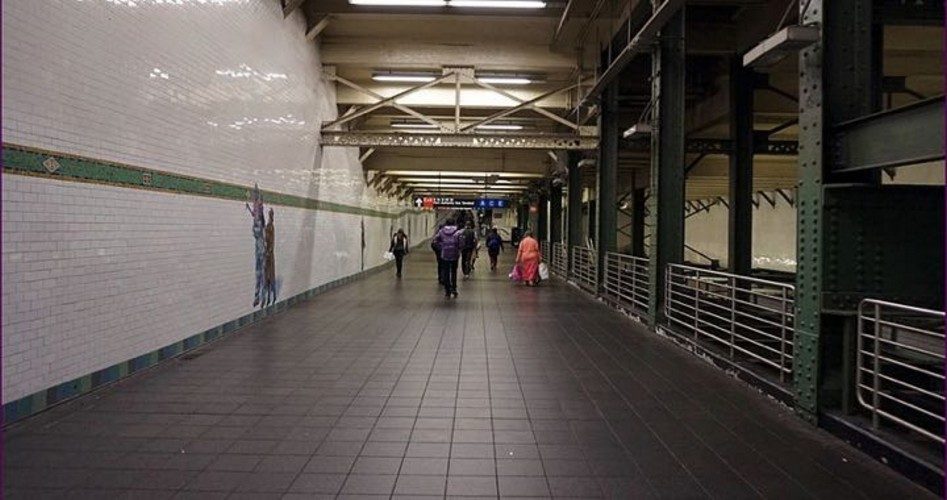
Blending in with the crowd of commuters rushing off to work in a Times Square subway tunnel early Monday morning, no one took notice of the immigrant from Bangladesh wearing cargo pants and a heavy coat. The NYPD didn’t know who he was, and neither did the FBI. Akayed Ullah has been in the United States, thanks to the “green card lottery,” since 2011, and in that time has had but a single brush with the law: a traffic violation.
A former taxi driver and currently an electrical worker, Ullah set off the home-made pipe bomb at 7:20 a.m. and — thanks to an apparent inability to follow instructions he downloaded from the Internet — Ullah managed only to burn himself (his hands, his stomach, and parts even lower), while slightly injuring three other commuters nearby.
Almost immediately Port Authority Police Officer Anthony Manfredini ran toward the muffled blast, while calling for backup. He tackled Ullah and, with the help of three other officers, subdued Ullah. The bomb, which was fastened to Ullah’s chest by Velcro strips and plastic ties, was removed by Manfredini. Ullah was taken away to a local hospital for treatment, and within hours the tunnel was fully operational.
On Tuesday afternoon Ullah will be arraigned on numerous charges, including providing material support to a terrorist group and the use of a weapon of mass destruction.
President Trump took the opportunity to promote his immigration agenda, issuing this statement: “America must fix its lax immigration system, which allows far too many dangerous, inadequately vetted people to access our country. Today’s terror suspect entered our country through extended-family migration, which is incompatible with national security.”
The theme was picked up by Trump Press Secretary Sarah Huckabee Sanders: “The president’s policy calls for an end to chain migration, which is what this individual came to the United States through. And if this policy had been in place, then that attacker would not have been allowed to come into the country.”
Attorney General Jeff Sessions chimed in as well: “We have now seen two terrorist attacks in New York City in less than two months that were carried out by people who came here as a result of our failed immigration policies that do not serve the national interest.” Sessions was referring to Sayfullo Habibullaevic Saipov, the driver of the pickup truck who plowed into pedestrians in the city in early November. He was also a green card chain immigrant, from Uzbekistan in Central Asia.
Every year 50,000 green card F-4 visas are given away by lottery, with more than 10,000 of them won by American citizens’ siblings living in Bangladesh.
On the surface the logic appears to be sound: If the terrorists hadn’t won the lottery, they wouldn’t be in the United States and therefore wouldn’t have been able to inflict pain, suffering, and death in their quests to serve the Islamic State. The logic fails somewhat, however, when one considers that Ullah, in particular, appears to have been radicalized while living the United States. But overall the argument succeeds because without the visa lottery, terrorists such as Ullah, and other radicalized Muslims, have a much smaller chance of making it to this country at all.
Ullah frequently visited terrorist sites on the Internet and downloaded the plans for his failed bomb from the same source. Investigators have learned from an initial interrogation of Ullah that his attack was to “avenge the deaths of Muslims around the world” and in retaliation for U.S. air attacks on the Islamic State in Syria and elsewhere.
Deputy Commissioner for Counterterrorism and Intelligence John Miller said on CBS’s This Morning on Tuesday that Ullah wasn’t on police or the FBI’s radar, adding that it’s getting harder and harder to defend against such attacks. Of course, the government’s answer to terrorist attacks such as this usually consists of some type of unconstitutional government empowerment — for our own safety, of course. But this attack should call into question the wisdom of granting such powers to the government: Since Ullah downloaded information to commit the attacks from the Internet — and the entire rationale for the NSA monitoring all Americans’ electronic communications is to catch people such as Ullah — it is reasonable to ask why Ullah wasn’t caught before he attempted his attack.
Once a terrorist is identified, usually after the fact, extra-legal measures are sometimes used to gather incriminating information and evidence in violation of numerous constitutional guarantees. This is what upset the Ullah family. Through a spokesman for the New York chapter of CAIR — the often criticized alleged supporter of radical Islamic terrorism — the family complained:
[We are] heartbroken by the violence that was targeted at our city today and by the allegations being made against a member of our family.
We are also outraged by the behavior of the law-enforcement officials who have held [our] children as small as four years old out in the cold and who pulled a teenager out of high school classes to interrogate him without a lawyer, without his parents.
These are not the sorts of actions we expect from our justice system and we have every confidence that our justice system will find the truth behind this attack and we will in the end be able to learn what occurred [on Monday].
This reflects the tension between freedom and security. As terrorist attacks continue and accelerate in the United States, that tension will also increase.
Picture of tunnel near where the attack to place (picture taken in 2014): Manhattan
An Ivy League graduate and former investment advisor, Bob is a regular contributor to The New American magazine and blogs frequently at LightFromTheRight.com, primarily on economics and politics. He can be reached at [email protected].



